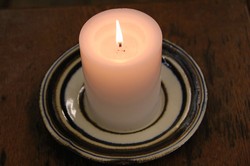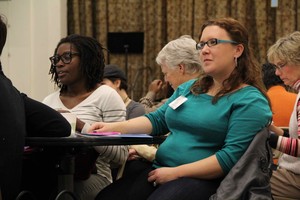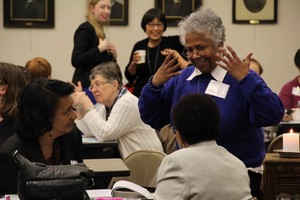Who is here?
What is our task?
What will we do to achieve that task?
What else will happen?
 Around a Christ candle, in the Fellowship Hall of New York’s Church of the Covenant, Presbyterian participants in the 57th Commission on the Status of Women gathered on Friday, March 1 to explore these and related questions.
Around a Christ candle, in the Fellowship Hall of New York’s Church of the Covenant, Presbyterian participants in the 57th Commission on the Status of Women gathered on Friday, March 1 to explore these and related questions.
Who is here?
A significant portion of the afternoon and evening was spent meeting one another and building the community. A generationally and ethnically diverse group, the Presbyterian participants come from across the country. Most are members and leaders of Presbyterian Women on the national and local level. Young Women’s Leadership Development brought a number of participants. Teaching elders, ruling elders, and deacons are represented One three-generational family is part of the group. All the participants bring a commitment to working to eliminate and prevent violence against women and girls, the focus of the Commission’s work. In different ways, in different places, each Presbyterian participant has already worked toward that day. Throughout the evening, the group prayed, sang, hugged, laughed, and planned. Intergenerational groups were created to provide support, conversation, and growth through the week.
What is our task? Working with partners in Ecumenical Women, group members will spend the next two weeks advocating with the Commission. The advocacy will be based on concerns and best practices identified by women around the world. Denominations and ecumenical organizations that are part of the Ecumenical Women coalition, including the Presbyterian Church (U.S.A.) and Presbyterian Women, consulted with international partners as the advocacy platform was developed. This process identified three primary concerns:
Working with partners in Ecumenical Women, group members will spend the next two weeks advocating with the Commission. The advocacy will be based on concerns and best practices identified by women around the world. Denominations and ecumenical organizations that are part of the Ecumenical Women coalition, including the Presbyterian Church (U.S.A.) and Presbyterian Women, consulted with international partners as the advocacy platform was developed. This process identified three primary concerns:
- Cultural, structural and economic violence are underlying factors that must be addressed.
- Education is a vital part of the change process, especially societal change. Education must incorporate men and boys alongside women and girls.
- We must pay particular attention to the needs of rural and minority populations and improve their access to resources and services.
As the Commission meets, Ecumenical Women (including Presbyterians) will advocate that the outcome document addresses these three concerns.
What will we do to achieve that task? There are a number of opportunities for Presbyterians and others to participate in that advocacy with the Ecumenical Women’s Advocacy Committee: serving on the committee, working on advocacy language as the outcome document takes shape, meeting with representatives of the Permanent Missions of Member States, faxing information to those missions, and more. Each participant may also serve as an advocate in all the settings of the Commission: questions may be asked in parallel events sponsored by NGO. The EW talking points may be shared in those settings. Participants are also advocates in conversations around the edges of the Commission. A person who attended last year’s commission told of talking with an individual for some time before discovering that the other person served as a diplomat for a nation’s Permanent Mission. The Presbyterian participant promptly shared Ecumenical Women’s talking points. The story provides a model for how advocacy takes place.
There are a number of opportunities for Presbyterians and others to participate in that advocacy with the Ecumenical Women’s Advocacy Committee: serving on the committee, working on advocacy language as the outcome document takes shape, meeting with representatives of the Permanent Missions of Member States, faxing information to those missions, and more. Each participant may also serve as an advocate in all the settings of the Commission: questions may be asked in parallel events sponsored by NGO. The EW talking points may be shared in those settings. Participants are also advocates in conversations around the edges of the Commission. A person who attended last year’s commission told of talking with an individual for some time before discovering that the other person served as a diplomat for a nation’s Permanent Mission. The Presbyterian participant promptly shared Ecumenical Women’s talking points. The story provides a model for how advocacy takes place.
What else will happen?
- Ecumenical Women will coordinate daily morning worship services. Presbyterians will lead worship on Tuesday, March 5.
- Daily advocacy debrief and planning sessions will occur.
- Parallel events will provide opportunities for learning and advocacy by education.
- The meetings of the Commission will be Webcast with the streaming video shown in the Conference Room of the Presbyterian Ministry at the United Nations.
- The intergenerational debrief groups will identify their own times for prayer and conversation.
- Presbyterian Women will sponsor a dinner for all Presbyterian participants. Ecumenical Women will also host dinners.
- Presbyterian Women will also sponsor an intentional intergenerational dialogue.
- Conversations and encounters with women and men from around the world with take place.
- Prayers.
And as always, the Holy Spirit will move in ways we neither know or imagine. We look forward to the possibilities.
Photos by Andrew Nam Chul Osborne.